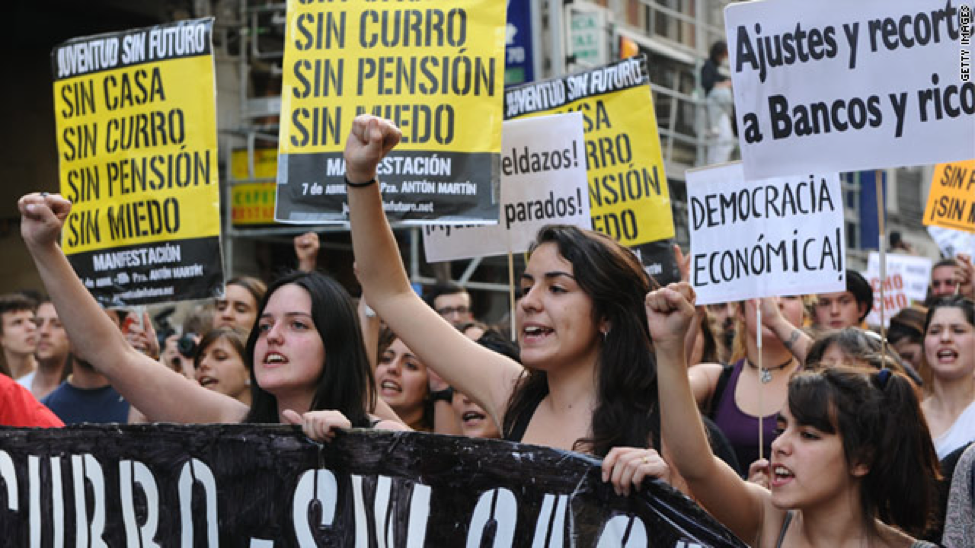
Pre-departure to Spain
By Genna Abele
[divider]
[dropcap]T[/dropcap]he world financial crisis of 2007-2008 hit Spain hard. A housing bubble, increased government expenditure, and relaxed government supervision of the financial sector led to the unsustainable high GDP growth rates that occurred in the decade leading to 2008, which Spaniards refer to as las vacas gordas, the years of the “fat cows,” due to the abundance of wealth and economic opportunities. When the crisis hit, Spain experienced devastating consequences, including a severe economic downturn, major increases in unemployment, and bankruptcies of major companies. By 2012, the country was unable to bail out its financial sector and had to apply for a €100 billion rescue package from the European Stability Mechanism.
Although drastically rising unemployment affected the entire country, particularly hurt were migrants, the poorly educated, and the young. Spain has a two-tier labor market split between permanent and temporary contracts. Workers on permanent contracts receive better pay, more benefits, and higher job security than workers on temporary contracts. Spanish companies responded to the financial crisis by firing workers on temporary contracts. Unsurprisingly, most of these were young people just out of school or university. Between 2007 and 2011, one in four young workers lost his or her job; in the construction industry, two out of three were fired. Those who entered the job market during those years faced even tougher odds.
By 2013, Spain’s youth unemployment rate reached 55 percent, the second highest in the European Union, just behind Greece. About 1.7 million Spaniards under age 30 were out of work, with almost 900,000 already classified as long-term unemployed (without a job for more than a year). Even today, with solid economic recovery gaining momentum, youth unemployment in Spain remains troubling at best. The current youth unemployment rate stands at 39.3 percent, and thousands of young people with university degrees remain unemployed or underemployed.
The persistence of overly protective permanent labor contracts alongside temporary contracts lacking such perks has created inefficiencies within the Spanish labor market that have slowed economic growth and post-crisis recovery. Young people often become stuck in a series of temporary contracts with few benefits, low pay, and the constant risk of unemployment. Secure, permanent positions with benefits and decent pay are rare for the young.
The impact of persistently high youth unemployment is not purely economic. Unable to enter the housing market and thus forced to live with parents or other relatives, many young Spaniards cannot purchase their own homes, build credit, or start families. Four out of five Spaniards aged 16 – 29 live with their parents, far more than before the crisis. Many are financially supported by their parents and grandparents, who did not anticipate the forced financial burden. Notions of long-term financial planning and independence have waned.
Anger against Spain’s political system has resulted. Juventud Sin Futuro (Youth Without Future) has emerged to advocate for more vocational training, improved unemployment benefits, and a proactive government. “We used to have certain promises about our lives and how our lives would pan out,” Ramón, a member of Juventud Sin Futuro, says. “They told us that if we study and go to college and learn languages, there would be a future for us, that we would be able to find work and live our life. That promise existed until 2008. But now the promise is broken for me and for a whole generation.”
As the promises of older, well-established political parties in Spain have failed to materialize for Spain’s youth, young people are looking to more radical parties for change. In the 2015 elections for the Cortes Generales (General Courts), Podemos, a left wing party, and Ciudadanos, a center, business-driven party, won unexpected victories, capturing 21 percent and 14 percent of the vote, respectively, when neither had received any percentage of votes in 2011. Both new parties promise major change to the existing political order to address, in part, the youth unemployment crisis.
As I travel to Leon, Spain this summer through a language immersion program, I will witness youth unemployment and its social and economic impact. While studying at the University of Leon, I will examine the issue with resident students and locals. How has the high unemployment rate affected their job prospects and daily lives? What do they think about the emergence of new political parties? And, importantly, do they see change and improvement on the horizon? In a few weeks I will report back on my findings. For now, I am excited to see Spain and meet my host family. ¡Hasta tarde!
[hr]
Genna is a Junior Global Affairs Major in Berkeley College.